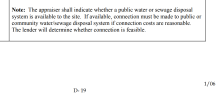- Joined
- Sep 23, 2004
- Professional Status
- Certified Residential Appraiser
- State
- Texas
How about "Public sewer runs directly to the rear of the site", "Public sewer is located across the street from the site". "Public sewer is located 5 mi from the site". By following the handbook in that manner, you have reported "availability" without the liability involved with providing a "feasibility study".“Appraiser must report the availability of public sewer to the site”.
There you go. Government is not the best on being clear but how can you determine, “availability” if you don’t do what I posted?
Last edited:


